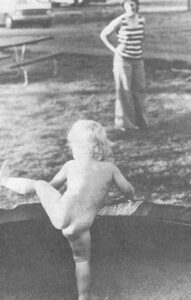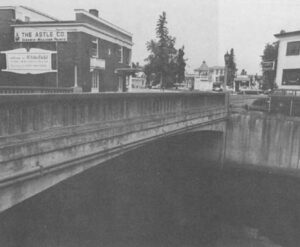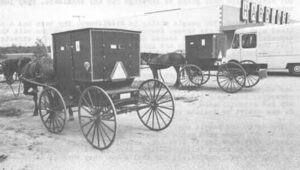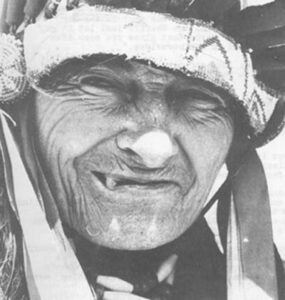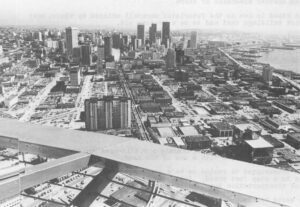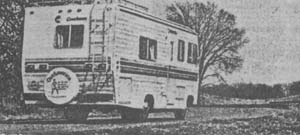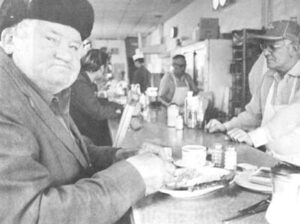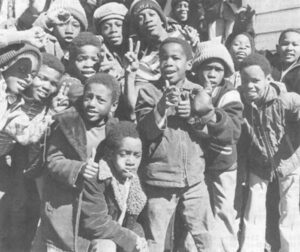BARSTOW, Ca. — Motoring free from the nerve-tattering traffic of Los Angeles, we soon found ourselves keeping company with an ocean of sand, cactus and tumble weeds that raced each other across the desert swells.
For seemingly endless miles the Lady K carried us toward one vanishing point after another. At one time Brandon aroused from his boredom to dart a forefinger toward an animal beside the road.
“Look dad,” he shouted, “big dog.” But he was only part right. It was an emaciated coyote trying to cross the highway.
It was the first living thing, other than humans in cars, we had seen for a hundred miles or more.
There was, however, beauty amid the heat and desolation of the Mohave Desert. It is a beauty of shape and shadows and being able to see for 50 miles or more in any direction. This Arkie had long been reinforced to see the wonders of nature among the rolling green hills and clear running streams of my native state. But this was of equal majesty in its own right.
Nature had taken her hand to this area, and throughout the Southwest long ago. Here was a region where the shadow from a distant butte was enough to force a sigh, where a towering cactus set against the dark purple of a distant mountain range forced me to stop for a prolonged look of admiration, where sandstone formations and its erosion stand like monuments to the thousands who have trekked past them during the past 200 years.
There is no sunset anywhere that can compare to one in the desert. The sky begins to glow light pink as the afternoon slips into dusk. The mountainous horizons turn from blue to near black, then only a sharp outline against a. flaming pink as the mother sun finally surrenders another of her days to the loneliness of night on the wasteland.
Almost half way between Los Angeles and Las Vegas lies the town of Barstow, California. It sits like an oasis for travelers headed either way. Actually, I found Barstow to look a lot like it sounds…hot, dry, just sort of there in the middle of nothingness along Hwy. 15.
Anchoring the Lady K five miles east, we boarded the Honda and went back for a second look at the town. A young gas station attendant named Steve said he thought Barstow was a good town for people with families who were content with a better than average place to raise children. But he told me he was leaving soon for “more action and better money.” Like many other smaller cities, Barstow had one primary street lined with shops and stores and fast-food restaurants and gas stations. It was flat.
A friendly older man named Ralph who was walking the street alone told me about a place called Calico only seven miles from Barstow and two miles from our camp ground. It was a deserted ghost town where hundreds of miners once tunneled day and night in search of silver ore. “A real piece of history and something you oughta see,” he said. “It’s fascinating.”
The next morning we drove toward a cluster of small mountains within sight of the motor home. A group of board buildings was nestled on the side of one hill and we parked beside a few other cars on an asphalt lot below Calico.
A grizzled fellow who didn’t smile much was the conductor for a 200-foot trip up the hillside in a reconverted mine cart…for a quarter each, of course. This was the first clue that the ghost town of Calico was, in fact, very much alive and thriving on the dollars of passers-by in search of what Ralph called “fascination.”
It didn’t take long to find a promoter’s hand at work amid the restored buildings. Like so much else we’ve seen beside the highways of America, Calico had been transformed from what undoubtedly had once been an interesting and absorbing piece of mining and human history into a carnival-like atmosphere complete with pottery shops, spice stores, an ice cream parlor and a leather business where you could buy a cowhide purse for $25.
Most of the original dwellings had either been razed or collapsed with the passage of decades, but there was enough still unspoiled to get an idea of what life had been like for the thousands who once fired their evening stoves at the foot of those hills.
For another 50 cents each, Kathy, Brandon and I loaded onto the local train ride piloted by a young man in his early 20’s. The trip made a 400-yard circle past several of the former homes and diggings of the silver miners. A scratchy tape recording told us where to look to see what once had been a Chinese settlement of about 600 people and to glance up at the mine shafts near the top of the largest hill above Calico.
Brandon said he wasn’t the least tired after that five-minute trip, so we strolled another 50 yards and fished the wallet from my hip pocket again. This time it was a nominal fee to wander about 200 yards through a portion of the Glory Hole mine shaft where they had placed stuffed dummies at strategic locations to awe us tourists.
Actually, it was interesting to learn that two miners had spent two years living in a small room inside the shaft. It seems they decided it was the most convenient spot if they were going to be working down there anyway. Their home was a hollowed-out cubicle about eight feet by nine, complete with dual hammocks and a miner’s lantern.
Brandon insisted, being six now, that we could leave him in the hole a while and let him try his hand at homemaking. But he gave up the idea when I explained how dark it gets down there…at night.
Back in the sunlight, a poster tacked to the side of a popcorn and cotton candy machine caught my eye. “Announcing Calico Days,” the flyer said the annual ghost town whing-ding was only a week away. I went on to read how Calico Days was a cool-weather ritual designed to draw people from throughout the region.
The only requirement for attending was a fat pocketbook, carnivorous appetite and a desire for witnessing such authentic ghost town culture as: phony gunfights and fast-draw contests, melodramas, organized games, popcorn eating and gulping down ten-ounce carbonated drinks.
If I sound a bit cynical, perhaps it’s because I’ve become that way toward the countless schemes of fast-buck promotion experts we’ve seen during the last 14,000 miles. Even the smallest of towns, it seems, has entered the marathon to become either a convention center or a tourist mecca. There’s nothing really wrong with the race, I suppose, unless the exploitation robs history itself, or until the entire nation evolves into one big gift shop with an animal show out behind and pay toilets in the rest rooms.
To me, Calico, California, stood on its own merits as exactly what it was…a dilapidated town whipped by the frequent dust storms of the desert, a place where our ancestors toiled away lifetimes in pursuit of the American dream — the opportunity for sudden wealth and comfort and the status that goes along with the whole bit.
Beneath this plot of earth people once labored from before dawn until after dark every day. They literally lived in blackness for years until the ground had surrendered her bounty and lay spent under their boots. Then she had claimed a limited revenge by forcing her ravagers to abandon homes, friends and livelihoods in search of yet another portion to rape.
This, to me, was the essence of Calico, laced with other human ingredients that comprised the daily lives of those men, women and children of that era. How I wished the town had only been wind blown remains with a salty old caretaker around to keep the looters at bay.
We plopped down on the wooden steps beside a business that specialized in making its customers feel like they were standing sideways in a log cabin if they would only pay a dollar or so for the thrill. Twenty or thirty other tourists were wandering in and out of the shops along the paved street.
Overhead, gusty breezes shepherded cotton puffs across a powder blue pasture. It was a day made just for Fall. Suddenly, a speaker blared through the canyon, proclaiming the start of a continuing “old timey melodrama in the town theatre.”
The sign said $5 for the three of us to see the performance. We went to see the wooden wagon wheels for free. They were anchored in the dirt beside a shop where you could have funny newspaper headlines printed with your name, or buy a set of drinking glasses with the name Calico branded across the front…so you could prove to friends you had been there.
Another trip into my jeans pocket located just enough coins to ride the iron miner’s cart back down to the parking lot. We drove in silence back to the Lady K, brewed a pot of coffee and watched the sun disappear behind a distant butte through the kitchen window.
LAS VEGAS, Nevada — Las Vegas is a glitter, a flash, a thrill, a tear, a disappointment and sometimes a despair.
Standing like a spectacular lighthouse in the turbulent desert sea of cactus and sand, the city is a harbor for endless ships of fools filled to their quarter decks with dreamers. They dock from every state, intent on returning to pay off the house note with winnings…sometimes losing the house in the process.
We were like so many others must be during our first encounter with the ringing bells and flashing lights of a casino. My bottom jaw dropped and Kathy swears I emitted a colloquial expression the likes of “shoot fire…”
Brandon thought the casino was a giant fun place made just for kids and, in a way, I suppose there was some wisdom in his belief. He was bitterly disappointed he wasn’t allowed to pull the silver handles or get even close to one of those machines that “makes nickels and quarters.”
There’s not a whole lot one can write about Las Vegas that hasn’t been said hundreds of times before. If a person has experienced the city, they know the excitement, the anticipation. If they haven’t been there, who is capable of perfectly relating a smell, a taste, a feeling in words?
We had been in town a day when word was passed to me about a nude show girl who was also an ordained minister in the Church of Scientology. I wanted to talk with her, to ask about her life. In two hours the time for our meeting was set and with pad and pencil in hand, I was motoring toward the Hacienda Hotel and Casino along the Strip.
If you’ve never been backstage in a Las Vegas showgirls’ dressing room don’t feel bad. I hadn’t either until Julia Baumer invited me back before the early performance of “Spice on Ice”, an all-nude ice review performed twice each night at the hotel.
I suppose I must have looked more relaxed than I was, because the bare-breasted girls who were hurrying about in the room didn’t seem to care that I was there.
Nudity is a lot like anything else, if you do it routinely and for a living, it’s comparable to a mailman delivering mail or an editor editing the news wire — You do it instinctively without thinking or worrying about it.
Julia was the lead nude and the program cover girl for the show. Her shimmering blonde hair was pulled back and cascaded down the back. Heavy artificial eye lashes were glued perfectly in place and she radiated warmth and sincerity as we sat talking in front of her make-up mirror.
“I was ordained a minister in the Church of Scientology about a year ago,” she said. “The ceremony was held at the church here in Las Vegas.”
But why did a nude entertainer want to become a minister? The two don’t have much in common.
“Well,” she continued, drawing a brush through her hair, “I’ve always been interested in mankind. For years I’ve read about and studied different religions and so many different beliefs. But the studies really didn’t help. I didn’t feel, when it was over, that I’d learned a damn thing.”
“I took off for a while and toured some poorer countries to see how millions of others were having to spend their lives, and believe me, I saw poverty as I’d never seen it before.”
“Along with it, I saw how different people relate to their different gods. That confused me even more. When I happened across Scientology, about three years ago, it seemed to answer a lot of questions for me and I could find some comfort in those beliefs.”
Julia said she began studying the principles of Scientology at home for several hours each day and eventually grew to seek ministership in the sect.
“There’s nothing in Scientology that conflicts with most other religions,” she went on. “Basically it says you seek the meaningful and the good in life from those around you and from within yourself and the decisions you make every day.”
More scantily-clad women entered and began preparing for the show as we continued. My concentration level was faltering, but I kept nodding my head to let her know I was listening.
Julia told me she’s now fully ordained to perform marriages, funerals, baptisms and any other rites reserved for the people of the cloth in America. I asked if she had performed any of the rituals. “No, not yet,” she said with a smile, “but I did marry my two pet white doves just for the practice.”
The doves are part of her performance during a “Legend of the Inca’s” scene where Julia skates onto the ice followed by the pet birds she has trained to stay with her.
Around me I could smell intermingled aromas of rouge, lipstick, perfume and white shoe polish from the dozens of ice skates. Girls were talking and laughing in different conversations.
She went on to explain about the counseling role in Scientology, a job she performs with heartfelt dedication. “I once spent 12 and a half hours counseling one person about her problem” she said, “and then I had to write it all up. I spend a lot of time counseling others with problems.”
When she’s not dancing or ministering, Julia can be found in her apartment or horse back riding, a sport she’s just discovered. “I’ve been three or four times and I love it.”
The girls were into their costumes and some were filing past us out of the dressing room toward the stage. There was still so much I wanted to know about Julia.
She told me she was a native of Michigan who once skated with the touring “Holiday on Ice” show. She came to Las Vegas four years ago.
Her mother lives in Lansing, Michigan and her brother is in the service, stationed in Germany. “Mom and my brother came out to see me last August,” she said. “They enjoyed the trip and thought I did good in the show.”
I paused momentarily, then asked what life as a Las Vegas show girl is really like. “Filled with misconceptions,” she said quickly. “If you saw a show girl on the street tomorrow, you probably wouldn’t ever know it.”
“I’ve got my performance down like I want it and I’ve learned to deal with hecklers. I just smile at them and wink. It works wonders, believe me,” she added.
We rose and walked out of the dressing room. It was almost time for her opening appearance at the 8 p.m. dinner show.
Making our way down the narrow, steep flight of stairs, I asked her if she was engaged or dating anyone steadily. She flashed a grin. “Well, I met this doctor last year and he’s, well, he’s separated from his wife and we’ve been seeing each other some. I like him and I feel he likes me, too.”
She went on to explain how she had met the general practitioner through a mutual friend the year before at the Hacienda.
The hardest thing for her in the job is staying away from sweets and doing the necessary daily exercises to stay trim. “I get hungry a lot.”
Show girls in general usually start at close to $300 a week in the city of roulette wheels, sometimes more and sometimes a little less, according to Julia, who didn’t tell me what she made…and I didn’t feel it that important to ask.
We stood behind the massive stage curtain for a moment before saying goodbye. In that time, I asked if she was satisfied and what, if anything else, she wanted from her life.
A serious expression moved across her face. “There are lots of nights when I’d like to put my robe on and just do nothing for an evening. This is exciting at times and I have skated all my life, so I love that. I suppose if I can continue in my ministerial work, I’ll find more fulfillment. I say that because I already have found satisfaction to a great extent.”
I waved goodbye and she skated into position behind the curtain.
There was an instant of shadowed silence before the drape rose, flood lights snapped on and pretty Julia Baumer glided gracefully onto the ice and began the 8 p.m. performance of “Spice on Ice”.
It had been an evening for the diary.
LAS VEGAS, Nevada — Like the other major hotels and casinos along the famous Strip, the Hacienda offered several restaurants, a dinner show, a gaming area, lounge and more than 500 rooms. I came to know that place by sight after talking with Julia Baumer, a show girl-minister there who had been in the city for four years.
During breakfast one morning, Kathy mentioned how difficult it must be for a person to manage such a vast, complex network as a Las Vegas hotel. Her comment led me to call the Hacienda once again and ask for the general manager.
Clem Bernier was the sort of fellow who talked quickly and to the point. Our conversation was brief.
“Hello, Mr. Bernier, I’m a journalist and was wondering if I might spend a while with you to see what one of your business days is like?”
“Sure, when do you wanta do it?”
“Well, I hadn’t thought that far ahead.”
“Be in my office tomorrow morning early and don’t worry about coffee. I have my own.”
And so I met Clem whom I came to know as a human tornado, a man with the necessary ability in his business to concentrate on five subjects at the same time and carry on three conversations while doing it.
His large, carpeted office was on the second floor of the Hacienda and an attractive young woman named Jerri sat at guard near the entrance. I introduced myself and she said to go inside…”you’re expected.”
A short, animated man with balding hair, dark complexion and a pleasant face, Clem sat behind his dining-table-sized desk talking on the telephone when I peeked around the corner.
Another man was sitting on the long couch and Clem spied my notebook and motioned for me to take one of the four seats.
Dropping into the chair closest his desk, I listened to him explain how the Hacienda was “out of rooms for the weekend with no exceptions.” The man on the sofa was thumbing through a notebook while inhaling deeply from a filterless cigarette.
In a moment Clem laid the phone in its cradle and introduced himself. Clad in tan pants, white shoes and a colorful shirt, the congenial 44-year-old looked a lot like I’d anticipated. He hurriedly explained how hectic things would be during the day and that he might not have much free time to carry on lengthy conversations.
I said I understood, but that was fine since I only wanted to try to capture what a routine work day was like behind his desk. Jerri poured me a cup of coffee and the phone rang again.
“Hope you like the sound of ringing bells,” he said with a broad grin, “cause babe you’re gonna hear ‘em today.” Flipping the note pad to a vacant page, I began scribbling down his sides of the various phone conversations.
“Yea, yea, it’s me…I’m supposed to be at the studio at 11:30 this morning for the program…gottcha, right, I’ll be there,” he said into the phone. “Alright, bye.”
“Jerri!” he screamed into the adjoining office, “remind me at 11 to leave for the United Way thing on TV today. We gave $l2,000 this year and set some kind of record or something.” He looked toward me. “Man I’m proud of these people at the hotel. Did you know the wage earners gave 100 percent this year? I’m talking about the people who earn $2 and $3 an hour, not the bigger salaries.”
The phone interrupted his train of thought.
“Clem Bernier…yea John, what can I do for you? What time is it there anyway? Man that’s three hours difference…Okay, I’ll take care of it. Don’t worry about a thing, it’s done…sure…you bet babe. Okay man…love ya, bye.”
Three others came into the office and Clem told them to find chairs. He introduced them as department heads there for the daily staff meeting to discuss problems in the hotel.
The phone rang.
“Clem Bernier…um hmmmmmm, yea, well, you owe the bill my friend. What can I do for you other than costing me and arm and a leg? I see. Well…you take care of your obligations and we’ll discuss the other some other time, keep smilin’ babe.”
The meeting began again for several seconds. The phone rings.
“Clem Bernier here. Oh Christ, ten Peruvian silver saddles and the trimmings are on there way…that’s right, we’re flying them in for a special display this weekend. The government of Peru is loaning them to us…yea, yea, we need something to display them on right away, they’re coming in the morning. Just send Smith up here right away…yea, Bye.”
The trio relaxed in their chairs. It was apparent they’d endured the scene many times before.
“Okay folks, where were we?” Clem launches himself back into the session for all of two minutes when a man appears at the door. Two ladies are standing behind him, waiting their turns in the office.
“Come in Smith,” Clem shouts, casting a glance toward me. “This guy costs me $150 a day and I don’t want to keep him waiting.” He quickly explains to the man about the saddle holders he needs for the saddles, then ushers him out the door.
The women smile an impatient sort of smile and the phone is ringing again.
“Clem Bernier…yea, what about those ads? Now if I know your agency, you’re charging me an arm and a leg alright…Do you people know I got a bill for $200,000 from you for August…that’s a two with six zeros…did you hear that? You’re gonna bankrupt me, you take care of it, that’s why I’m paying you. Bye.”
The meeting is diagnosed as hopeless for the moment and the three leave while the two women are entering. In the fleeting seconds between, the fellow on the couch jumps up and scurries to the desk to discuss a promotion for helicopter rides at the hotel. He’s with Clem for less than two minutes and the hotel manager turned to welcome the ladies who are there in search of rooms for the female pilots of an upcoming Powder Puff Derby airplane race.
Clem drops into his chair and listens for ten seconds. The phone rings.
“Clem Bernier…yes, yes, yes, we need about 16 more deer, antelope and moose trophies to complete the casino…that’s right, talk with Mike, he’s handling the project. Right, it’s a deer hunting promotion and contest, yea, you bet, later.”
The women pick up their story momentarily. Another man enters the room and motions to Clem. “We have a little security problem,” he said in a half mumble. “That’s nothing new,” Clem laughed. “I’ll bet we have ten a day around here.” He spoke with the man, then returned to the women.
But the phone was ringing.
“Clem Bernier…no Jerri, I do not want that doctor to have a complimentary ticket. He’s to have a pass, not a comp…I comped him last night to dinner and the show and he brought seven people with him. He took advantage of me…a pass not a comp, clear? Okay babe.”
The phone rings again and the impatient ladies squirm a bit.
“Clem Bernier, rooms you say? Rooms, huh? Well, I don’t know. That many? I might be able to locate a few here. Let me get back to you later.”
After ten minutes, he agrees to help the Powder Puff ladies, one of whom was married to the man who invented Tang breakfast drink, I later discovered.
They left smiling and an advertising man came in to assume one of the vacated seats.
The phone was ringing.
“Clem Bernier, Oh Chuck, come in and see me this afternoon. I have people in my office…you’re where? In El Paso looking for a show girl? When do you need her and for how long. Yea, the airlines is going to use her to promote a new run to Vegas, eh? Yea, okay if you pick up the ticket, we’ll send a girl down for the promotion. Maybe I’ll come too…yea, yea, okay fine. Get back to me if there are any changes, right. Love ya babe.”
There was silence for a moment and I used the opportunity to discover Clem was a native of Lewiston, Maine, who had once been married for 15 years but had been divorced for the past six.
He had been in the hotel business for 25 years, beginning as a bellman for a hotel back East.
He said he left hotels for a while to open his own management consulting firm, after managing the Circus Circus Hotel and Casino in 1974.
It was there he experienced what doctors diagnosed as a cardiac arrest. “I carried one of those beepers around with me, you know, the type that signal you wherever you are if you’re wanted. I know that’s what gave me the heart trouble.”
He lives with his son, Michael, who’s a senior in high school.
The phone rang again.
“Clem Bernier here. Yes ma’am, uh huh, right. Yes if you’ll bring the kids in next Tuesday, we’ll be glad to show them the animal trophy display and we’ll even feed them at the buffet. Sure, oh, by the way, did you know I’m on the board of your children’s home, yea, the board of directors. Well, it’s been nice talking to you, too and I hope I’ll get to meet you some time…”
He spoke with the advertising representative for about two minutes, then asked Jerri for more coffee. While she was pouring, he whipped a small pink package of artificial sweetener from his shirt pocket and dumped it into the black liquid.
A filter-tipped cigarette made it to his mouth before the coffee and the phone rang.
“Clem Bernier, oh, hi French. Yea, I wrote six letters on the plane yesterday. We closed the corporation out, right…yea, okay…no, no, no, that guy is so broke that his tail pipe broke off his car and I had to pay for it to get him a new one…no. Okay bye, babe, love ya.”
He hung up and stared at me. “Great publicist that guy!” he said shaking his head.
All morning people were flocking in and out of his office, asking mostly for favors of one form or another…Give me this or that, or I need this or that. He maintained composure better than anyone I’ve ever watched under such stress, and had knack for sifting the greedy from the needy.
During those hours I also found that Clem was close friends with astronaut Eugene Cernan and had an American flag given to him by Cernan that had been taken to the moon in 1972 on Apollo 17. He treasured that flag.
Clem also told me he had managed the Hacienda for about a year since leaving his consulting firm. Since that time, he has brought the suffocating hotel back to life with his unique brand of resuscitation.
He no longer uses a beeper, but finds that little relief since everywhere he goes in the giant house, there’s always someone who seeks him out or has him paged on the intercom.
Even in the darkest corner of the cafe, three people found him and four phone calls came in before he could devour a sandwich and gulp down an iced tea.
And in the afternoon was an endless stream of calls:
“Clem Bernier. Uh huh, we can do mailings, but we need to get something I can take to my board. Right, do it and get back, okay, bye.”
“Clem Bernier here. Sure, sure, sure…you bet. I’ll bring about 70 decks of cards and some key chains with me for favors…no problem…bye.”
“Clem Bernier. Okay my man, bring the contract in and I’ll sign it. Yea, love ya.”
“Clem Bernier. Yea, tell him to go to the conference room and I’ll be there soon.”
“Clem Bernier. No, nope, when the guy comes in just give him the application for employment. I’m not going to marry him for Christ’s sake.”
“Clem Bernier…no, I’m in court all day Monday. We’re being sued and you know how that goes…let me see what we can do. I’ll get back when the smoke clears.”
“Clem Bernier. Now Chief I’ve told you I was in L.A. all day yesterday. Yes Chief, I know, I know. For what date Chief? Who called you back? What date? No Chief, Jerri says it’s today we can’t take you…there’s a communications problem, wait a minute. Okay November 28 you’ve got the rooms Chief. It’s a go for then babe. Send a check, Chief and we’ll be looking for you…be sure to wear your feathers…yea…bye now.
“Clem Bernier here. 1982? Let me check…all right, put me down for 300 rooms …I understand…Lions International…okay you got the rooms in July of 1982 for the Lions convention Bobby. You bet babe.”
The phone rang on into early evening and Clem showed no signs of slowing.
We found a short while to talk late in the afternoon when he told me it costs $65,000 a day just to open the doors and do business at the Hacienda. There are 900 employees and well over 500 rooms to maintain not including the hundreds of customers fed at morning, noon and dinner buffets.
Although he received a degree in management from San Diego State, he said he didn’t learn the hotel business in a classroom. “I learned it from the ground up,” he said. “I know this profession.”
His happiest moment of the day seemed to come when he talked about the unique deer hunting promotion underway by the hotel. They had secured prize hunting trophies from out of state and leased them for a month to hang in the casino as part of setting a mood for the contest.
There were nearly 60 trophies in all, including two that were listed in the Boone and Crockett records book. They were working hard to cater to every hunter in four states.
His problems of the day had run the gamut from personnel to food to security to housekeeping. It was an incredible job, too large to ask of one man and that was why he had department heads, all of whom seemed competent.
But, I could tell Clem was the sort of man who was more secure handling as much as he possibly could bear by himself…and then some.
I also knew I wouldn’t have Clem’s job for the fattest of fat salaries and his spacious plush quarters.
But then, I wasn’t Clem Bernier.
When I left his office, it was well after 6 p.m. and he hadn’t even thought about dinner. I shook one hand while he answered the phone with the other. On the way out I eavesdropped one last time.
“Clem Bernier here. Yea babe…yes, coming in tomorrow? Give them preferred treatment. Heck, babe, they’re bringing their convention here. Tell Rudy to give them a good spot…you bet…yea…yea…bye, love ya.”
FLAGSTAFF, Ariz. — The trip from Las Vegas to this university town was similar to the drive from Los Angeles to Las Vegas, barren with rolling hills, buttes and mesas along Hwy. 93 and Interstate 40.
We had stopped just south of Las Vegas to ogle Hoover Dam beside a thousand other camera-toting oglers. A free movie in a gift shop back in Boulder City, Nevada, had explained how the architectural feat was achieved some four decades ago, so we had at least some ideas of what we were ogling.
The Lady K was too large to park anywhere near the dam, especially with the four-wheeled lifeboat in tow, so we could only stare at the concrete rock for a few seconds while snarling traffic along Hwy. 93.
Even though we had seen pictures of the dam, and I’d even recalled watching a monster movie years back where some giant man destroyed it in technicolor before my very eyes, it was nevertheless a spectacular sight.
Kingman was another small desert town and we only spent one night at the KOA campground there before returning to the striped asphalt early next morning.
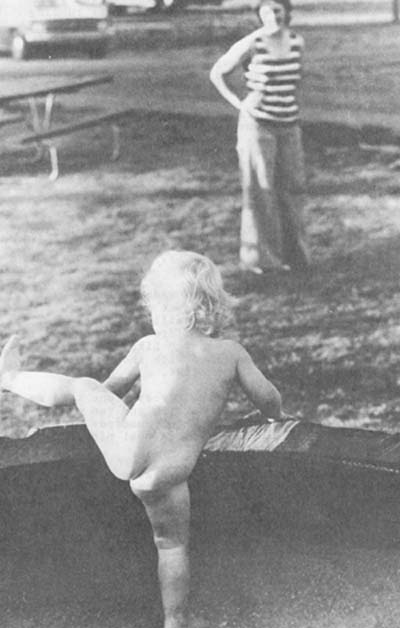
That evening, I went to a nearby tumbleweed mesa to run a while before dinner and frightened two jackrabbits the size of cocker spaniels.
Jackrabbits are fascinating animals to me. They seem to sit in contemplation behind small bushes in the middle of nowhere for long periods…maybe for their entire lives for all I know, or at least until some pesky, hard-breathing journalist forces them to seek another tumbleweed.
Sometimes they wait until you’re only a few feet from them before tucking their foot-long ears back and zipping away.
One ran only a few feet before stopping to perk up its ears and watch me lumber on past. I guessed I must have looked to him like a sprinting elephant would to me.
I had been unaware that Flagstaff sits high above the surrounding desert floor and, for that reason, is amply blessed with green, growing things like trees, flowers and other forms of life that make it a remarkably attractive place.
Watching over the city of 27,000 are twin mountain peaks, including Humphrey Peak, at 12,633 feet, the highest point in Arizona.
It took only a few days for we three to take to Flagstaff like thirsty camels to a desert watering hole. A soft breeze played continually in the pines above the coach and much of the area around Flagstaff greatly resembled portions of Arkansas.
Downtown Flagstaff maintained much of its history with older brick buildings intact in almost every block. However, like virtually every other town in the country, there is also a new suburban shopping area with about 200 businesses thriving several miles from the city’s center.
Intermingled with the historical impressions were also those of progress. Maybe it was primarily the sight of so many young university men and women in the stores and around Flagstaff that left those feelings.
I suspect that was at least part of it, anyway. Almost every city with a college or university has projected a similar image and made us feel as though we were a part of the excitement and actually part of that community.
I had heard and read much in the national press about the bombing death of “Arizona Republic” reporter Don Bolles from Phoenix and I wanted to see for myself what had happened and who the man was.
Leaving the Lady K with empty sewer tanks and a smile on her face, we drove the lifeboat to Phoenix for a night, dropping down more than 2,000 feet after leaving Flagstaff on Hwy. 17.
We had driven for more than an hour and when somewhere between the villages of Bumble Bee and Horse Thief Springs Brandon caught sight of a cactus with arms.
I called them that out of ignorance of a proper name. They’re the tall, green plants I’ve seen in cowboy movies all my life…the ones that reach for the sky with four or five arms. This was the first we’d seen of them during the trip and nothing would do until Brandon got his hands on one.
Cars whizzed past on the freeway as we left the Honda and raced each other to a cactus near the road. I never knew it, but those smooth-looking, ribbed plants have long stickers all over their bodies. Brandon found out, too.
Back in the car, we finished the trip into downtown Phoenix in less than an hour. Once in the motel room, I called for the managing editor of the Republic and got a soft-spoken, middle-aged man named Harold Milks. He invited me to the paper, and I went.
Milks was a slender, balding man probably in his late 50’s, who sat in a rambling office behind a wooden desk. I sat down and told him I wanted to talk about Bolles. He smiled and motioned toward a stack of papers on a nearby conference table. “That’s some of the stuff he was working on when he was killed. I’m sorting through it now.”
Milks said Bolles had worked at the paper for several years. He was in his mid-40’s when a bomb planted in his car caused a lingering death in a Phoenix hospital. He was the father of seven children.
Bolles’ father had been a career wire service journalist Milks continued, and Don had been in the profession most of his life. He was an investigative reporter when he died.
The story surrounding the bombing was widely known. Early in 1976, Bolles was investigating land fraud in Arizona, a probe that reportedly involved several prominent and political figures in the state. He was summoned to a local motel by one of his sources who said he had information about the investigation.
Bolles arrived, waited in the lobby for the man, who telephoned instead of showing up, and said to meet him at another location instead.
When Bolles went back to his car in the motel parking lot it blew up with him inside.
The man who was to meet Bolles was later arrested and charged with the bombing.
But the general feeling in Arizona, at least among people I later talked with, is that the man arrested was paid by a group of people involved and possibly due to be exposed by Bolles’ digging.
There had been terrible public outrage among Phoenix residents during the months following Bolles’ death.
A fund had been organized immediately after the slaying and contributions poured in from throughout the state and the country to help support his widow and their children.
Physically, Bolles had been a slender man with graying hair, a hawkish face and glasses. The newspaper photo I saw reminded me more of a dentist or an attorney than a hard-driving reporter.
Milks pointed me toward the motel where the explosion occurred and that was the next stop. The Clarendon Motel wasn’t on a primary street. Rather we turned left off the main drag and drove about four blocks on West Clarendon Street. It didn’t look like a motel at all…rather like a modern apartment house.
Inside at the desk I asked a woman if that was where Bolles had died. I’d scarcely uttered the words when a man came from behind and demanded to know who I was and why I was asking.
I explained briefly and his face tensed. “Well, we just recently bought this place and don’t want anything bad written about it, understand!” He seemed to be almost pleading and I understood his feelings.
Assuring him I wasn’t out to defame the motel, I left and walked around to the parking lot. It was easy to see how someone slipped a bomb beneath his car out there.
It was a very large lot on the side of the windowless motel. There were few points from where anyone at night could have seen, much less identified, anyone else walking around.
A feeling of, I guess you’d say remorse, came over me out there in that lot. I never knew Bolles, or even heard of him until he was killed. But I nevertheless experienced a sense of loss that was heightened by being at the spot where he died. Part of my sadness lay in the fact that I knew he was trying to do something for the good of everyone in Phoenix and Arizona, to make it a little better, more honest place to live. And for that he was killed.
His execution was a commentary on the state of affairs in this country. Nowadays, if the “do gooders” get “too close”, they’re simply disposed of like swatting a mosquito or stomping on a cockroach.
Phoenix, with her wide palm-tree-lined avenues and modern appearance was an attractive city, but unfortunately I’d had my outlook temporarily dampened and found it hard to appreciate the beauty of that town.
We paused once more to feel a cactus en route back to the Lady K, then stopped at a fast-food Mexican place for dinner. I thought it was funny they sold small packets of antacid at the checker’s table. Kathy argued they should have given them away…
MEXICAN HAT, Utah — There’s not a lot to the town of Mexican Hat. But it was there I met a woman with two fingers missing who sold me a cup of coffee for 20 cents and traded some conversation for free.
I’d been driving for three hours across more of the threadbare landscape when we came to the town 100 people call home. A community named, I discovered from the woman, for a boulder to the north that resembles a Mexican sombrero resting on its top.
From the time we had left Arizona, 35 miles back, the desert-like terrain in Utah’s Monument Valley on Highway 163 had a unique appearance.
The Lady K was continually climbing to the crest of one hill, racing down into a valley and doing it all over again.
It was a strangely beautiful part of the country where the rock and sandstone took on many different hues and where giant granite columns, sometimes a quarter-mile across, rose from the flat ground and ascended to great heights, standing stark against the surroundings of the barren valley.
The people in the smaller towns were friendly and talkative. I finally had to excuse myself from the coffee lady to return to the coach and a self-service gas pump.
While dispensing the Lady K her steady diet of regular with nothing on it, I also met a fellow named Jim at the adjoining pump.
He was mumbling about the price of gasoline and how he didn’t believe there “had ever been any gas crisis to begin with.”
I listened as he rambled on about how he felt the big oil companies had gotten together and figured out a way to double the price of gas overnight and have the American public swallow the scheme. With a chuckle, I asked if he could prove any of it.
“No, darn it, I can1t prove it, But this is America by God, and I can sure as heck believe like I want.”
I told him I’d heard others throughout the country express his sentiments more than once. He laughed out loud and said it was comforting to know he wasn’t the only “narrow-minded, red-neck” in the United States.
Jim told me he was a traveling salesman who worked throughout southern Utah and northern Arizona for a paper goods firm. He said he was homesick and ready to get back to Phoenix and his wife, Janice, and three kids.
He also asked what we were doing on the road and I gave him the standard short answer.
“Oh, man, what a life…a whole year to roam America and just meet and talk with people. Some guys get all the luck. I’d give my left leg for that chance.”
I smiled and nodded. “Yea, I am lucky I guess. But you’d be surprised how homesick and lonesome you can get out here on this highway after seven months and 15,000 miles.” I suppose I was trying to tell him the journey has been productive and enjoyable, but hasn’t always been as romantic as it sounds on its face.
“Yea, I know what you mean,” he said. “This ole road will eat you alive if you’re doing it day and night. I put 22,000 miles on my car last year just traveling back and forth between the two states.”
Returning the nozzle to its slot, he lifted a $20 bill from his wallet, shoving it toward approaching attendant.
Just then, his eye caught the flash from a penny lying in the dust near his feet. Stooping to pinch it between his thumb and forefinger, he stood and handed it to me.
“Here,” he said, “take this for good luck. They say a penny is good luck if you find one and I’m transferring any that might have been in this one your way. Afterall, you’ve still got five more months to go.”
I told Kathy I’d never forget Jim and that gesture.
Before moving farther northward, I want to retrace a few miles, back to northern Arizona and our impressions of the Grand Canyon.
Afterall, what self-respecting newsperson could tour the country, spend an evening at the Grand Canyon, and not mention it?
The Canyon was doubtlessly one of the most magnificent, awe-inspiring natural wonders we’d seen on our trip. But after 15 minutes we were ready to leave.
And that might very wel1 sum up the attitude of many others for I don’t think we’re that different from the average, ordinary, middleclass family that comes to stare at the massive chasm.
In 15 minutes, you can absorb through your eyes, the scope, grandeur and overwhelming dimensions and then, there’s nothing left except to go down into the Canyon and actually become part of it or go look at it from a different angle.
You see, the Grand Canyon reproduces exactly like all the photos you’ve seen of it and, in reality, when you’re staring at it…the thing still looks like it’s unreal, whether you look for 15 minutes or three days.
One of the most interesting things I discovered there was Mary, a bus girl in the cafeteria at the Grand Canyon lodge.
She was a native of Ohio and had worked summers at the Yavapai Lodge before quitting to go to Phoenix with a girl friend. She’d been back about a week and said she wanted to stay on the skeleton crew during the winter if she could.
Her father, she told me as I launched into a chicken fried steak, was wealthy and could give her about anything she wanted. But all she wanted was to work at the Canyon.
She was the type who bubbled when she talked, excited about everything and willing to share that exuberance with anyone she talked with.
I heard about how all the young men and women who work for the lodges usually get together in the evenings and have bon fires, beer busts, parties, or just go to the dance held six nights a week.
I discovered how she hadn’t liked Phoenix. “The people I met there were all so status conscious and materialistic,” she said, cleaning off remains on the table next to us. “All anyone ever talked about was what they owned, or were going to buy. It was shallow and I didn’t like any part of it.”
Mary said she got the lodge job through a placement office where she was going to college. “They told me I could work here if I wanted it, and I thought I’d try. Am I ever glad I did…man.”
She said she enjoys the fellowship between everyone who works there, but acknowledged there is jealousy between different job holders. “See,” she said, “there are jobs like busing, waitress, maids, cashiers, clerks, gift shop and so on. Some of the guys and girls get up tight about where they stand in their particular area.”
“For instance, I have a year’s experience here already, but because I left, they couldn’t just put me back as supervisor of the girls in the cafeteria…that wouldn’t sit well. So what they told me was they’re going to have me bus tables for a month, then move me into the position of supervisor.
“Heck, I don’t mind, I can do this just fine and it is good for me. But a couple of the other girls know about my background and they already resent me …oh well, that’s business.”
Mary was a bit on the pudgy side, but it was the portliness you didn’t notice …the kind that is hidden by more dominant features like a pretty smile, long hair and a vibrant personality.
I asked what Mary wanted to do after another stint at the Canyon.
“Well, this girlfriend of mine who works here, too, and I are planning to go to Europe next summer and just spend several months touring the countries. We’re saving money right now for it and we figure we can make it just fine on what we can tuck away.”
“And…I’ll probably get married some day.”
When we left the cafeteria, Mary had moved down three tables and was deeply engrossed in a conversation with a young man who was sitting over a plate of spaghetti.
After leaving the Grand Canyon, Brandon spotted sheep grazing on a sheer rocky cliff beside the highway. He wanted to stop, so we did and the three of us found a flat rock to roost on for 30 minutes.
It was fascinating to watch the two trained dogs keep the sheep free from dangerous areas. Time and time again they nipped at the hooves of the white furry animals, turning them back to safer ground.
A calf wandered down a dry ravine behind us and began bawling continuously. Brandon quickly announced we were taking the animal with us in the Honda back to its mother.
After carefully explaining the interior dimensions of the Honda compared to the calf, he agreed that we’d leave the small cow in the gully.
What we didn’t realize was that the calf had also been smitten by a case of long-distance fondness and, when we walked back to the car, he trudged up the bank after us.
Pulling back onto the highway was like a scene from “Love Story”. The calf was standing beside the highway bawling and Brandon was doing likewise in the back seat.
Received in New York on November 29, 1976
©1976 Mike Masterson
Mike Masterson is an Alicia Patterson Foundation award winner on leave from The Sentinel Record (Hot Springs, Arkansas). Mr. Masterson will travel throughout the U.S. with his family and write about the country and its people in 1976. This article may be published with credit to The Sentinel Record and to Mr. Masterson as a Fellow of the Alicia Patterson Foundation. The views expressed by the author in this newsletter are not necessarily the views of the Foundation.

